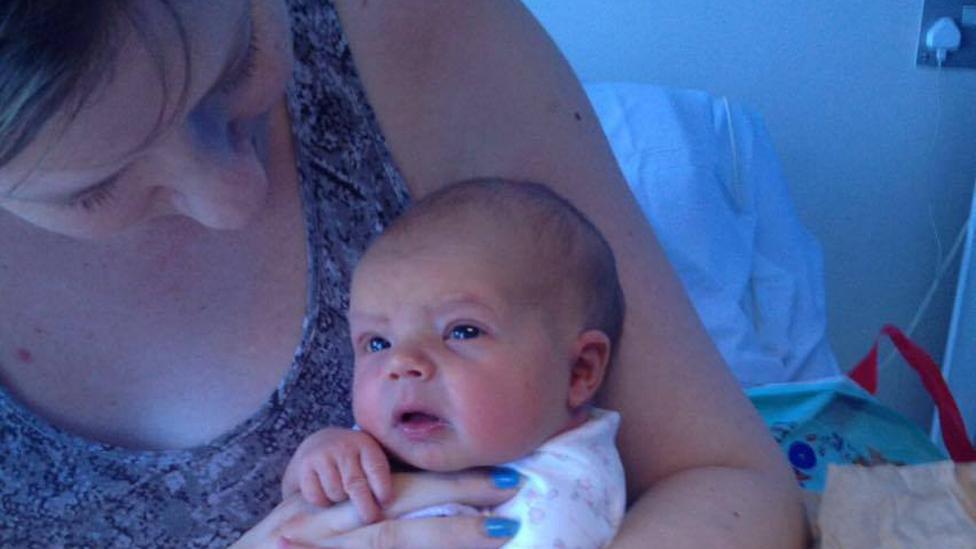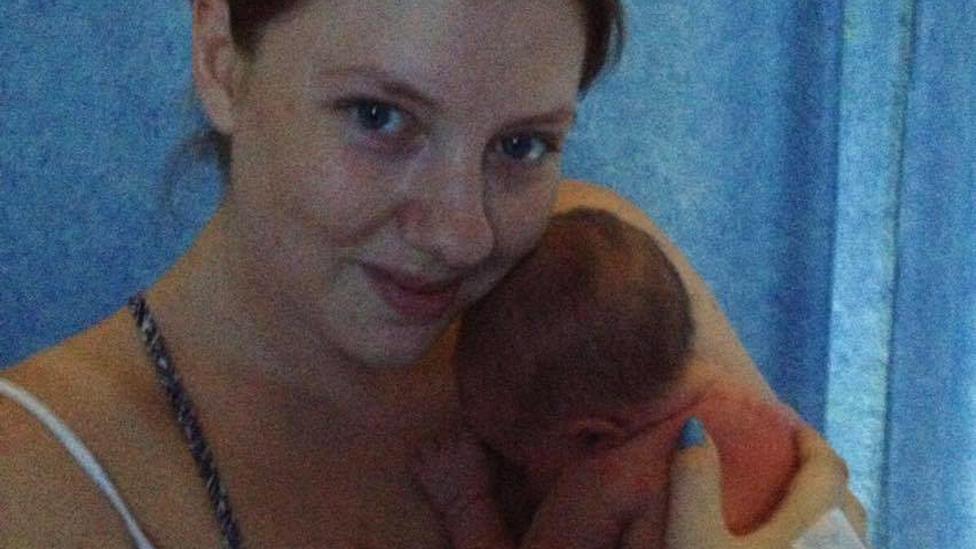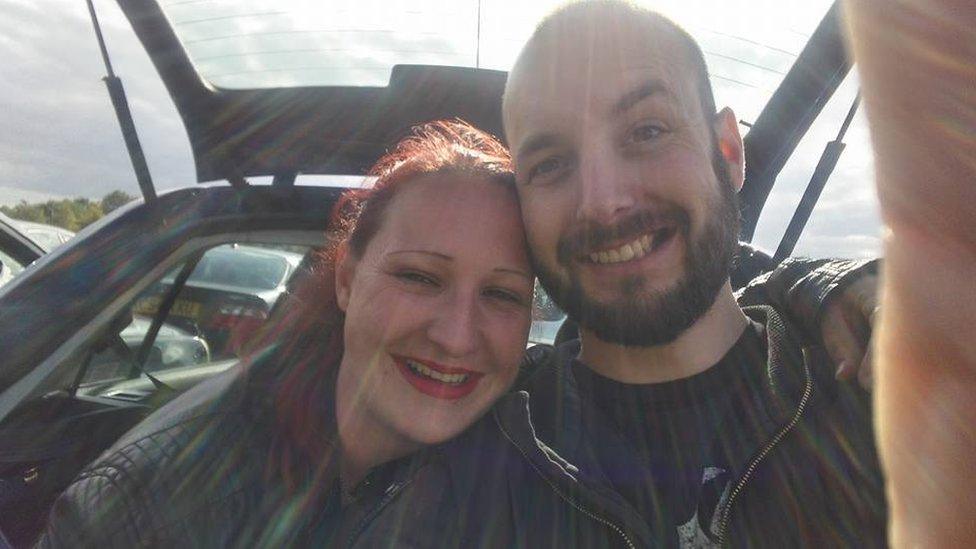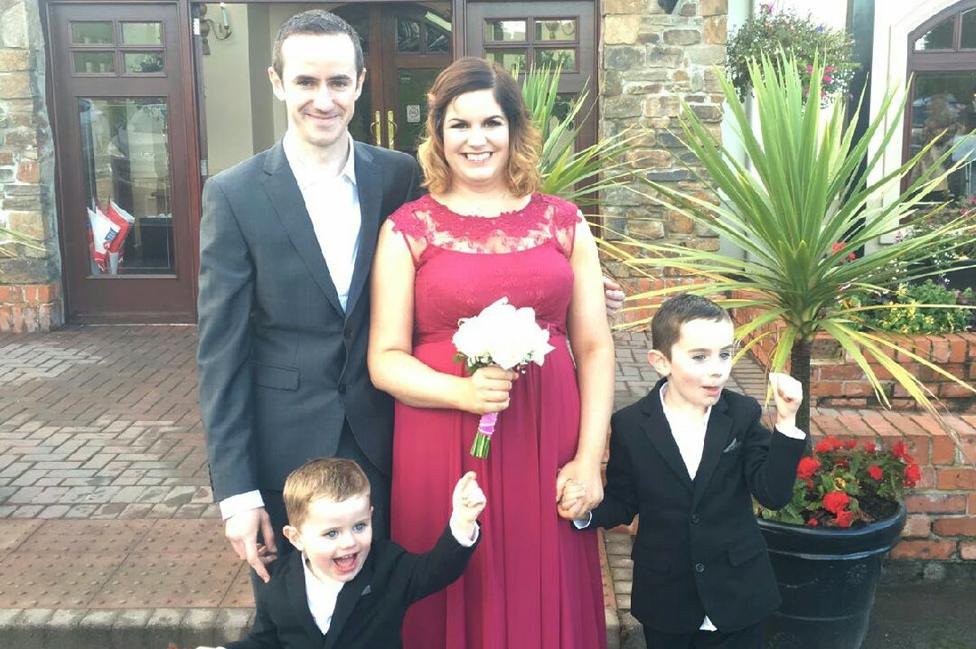Extreme morning sickness - your stories and advice
- Published

Pregnancy is rarely as glamorous as Beyonce's recent Grammy performance made it look.
But for the one in 100 pregnant women who suffer from extreme morning sickness, it's a serious health condition. And it gets worse.
A new survey has found that two-thirds of these women aren't getting the right information - or drugs to treat it.
The report on hyperemesis gravidarum (HG) in Midirs midwifery journal, external, is based on a survey of 400 women.
And it's backed up by the experiences of Newsbeat listeners.
They shared stories of multiple hospitalisations after not being able to hold down food or drink, being told off for not eating and not wanting to have any more children because their pregnancies were so unbearable.
'It was ironic that I had a life growing inside of me because I felt like I was dying'

Ellie Jewel with her newborn baby Lexi
Ellie Jewell, 29, from Yeovil in Somerset was in and out of hospital while pregnant with her daughter Lexi last year.
"I did not know it was possible to become so very ill from being pregnant," she told Newsbeat.
"I remember saying to someone that it was ironic that I had a life growing inside of me because I felt like I was dying - and literally could have, due to such severe dehydration."
The lack of understanding from NHS staff only made things worse, she said.
"The general attitude was that I was doing it to myself by not eating and drinking and I got the impression many times that staff simply thought I was seeking attention, because obviously I loved being stuck in hospital permanently attached to a drip full of fluid and minerals."
Reconsidering more children

Helen Graham with her partner
The vomiting, nausea and having to be signed off work is so unbearable that 1,000 wanted pregnancies are terminated each year, the report published in Midirs found.
Women who had suffered from hyperemesis gravidarum (HG) - including Ellie - said that their experience has put them off having more children.
Helen Graham from Hereford, who had "horrendous sickness" throughout her pregnant, told Newsbeat: "It has actually stopped me having more children as I don't feel it would be fair on the one I have to put myself out of action.
"It was actually depressing and what should have been an exciting time was a huge struggle."
Confusion over medication

Maeve O'Lynn with her family
Maeve O'Lynn was 25 when she first became pregnant, and was over the moon - until the extreme morning sickness happened.
"It felt like motion sickness, but constant. Standing up, being in a car, watching TV - all of it could bring on vomiting," she told Newsbeat.
"Once you've puked your guts up, you feel OK again, and a sense of relief and then the nausea returns about five minutes later and you just want to weep."
Reluctance to prescribe perfectly safe drugs to pregnant women was raised as a problem by Pregnancy Sickness Support, which carried out the research with Plymouth University - and that's something that Maeve found.
In Belfast, where she lives, cyclizine tablets were offered, which made her very drowsy, as well as prochlorperazine.
"And if it was really bad I was offered something they give to chemotherapy patients, but there seemed to be a great difference of opinion between GPs as to whether this was safe for the baby," she said.
Hannah Wort was throwing up from week eight to week 22 of her pregnancy with her son and told Newsbeat on Facebook: "I think I should have been told about the availability of the medication asap, as it did make a huge difference.
However Charlotte Owen for one was very happy with her treatment.
"I must have been one of the lucky ones (despite having hyperemesis for the duration of two pregnancies)," she told Newsbeat.
"I was given lots of different anti-sickness medication to take during both pregnancies (nothing worked) and even though the GP helped me as much as he could, there wasn't much more he could do.
"I was and I still am very satisfied with the care I received."
Advice for those going through it

For Sharon Hartley from from Garstang, Lancashire, who has had three pregnancies full of extreme morning sickness, her advice is to ask for - and take - as many drugs as are on offer.
"I had anti-sickness injections, suppositories - anything they chucked my way," she told Newsbeat.
She was signed off work, because she had to be hospitalised so much to get IV drips, and lost huge amounts of weight.
Her three children are now 16, 13 and eight and, looking back on that time, she has some advice for newly pregnant women suffering what she went through.
"Don't just dismiss it. Don't think I've got to put up with it. If you're not eating or drinking you need to be put on a drip," she advises.
"Don't be scared for asking for help. It's far more than just morning sickness."
Find us on Instagram at BBCNewsbeat, external and follow us on Snapchat, search for bbc_newsbeat, external